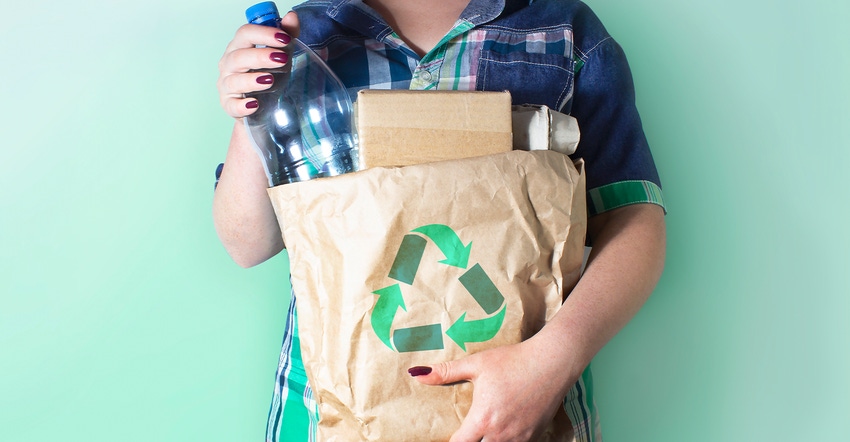October 5, 2021

The recently released 2021 Consumer Recycling Habits survey by the Paper and Packaging Board (P+PB), revealed that while 95% of Americans say they recycle (and only 25% of them recycle ‘some of the time’), fewer than half know the basics of recycling.
P+PB, in collaboration with Kelton Global, surveyed 1,005 U.S. consumers aged 18-74 -- from Gen Z to Baby Boomers -- about their preferences, behaviors, knowledge and attitudes around recycling.
“The survey results revealed that Americans are largely confused about the proper ways to recycle, including what materials are recyclable (though they say paper is the easiest),” says Mary Anne Hansan, president of P+PB based in McLean, Va. “Our goal with this survey was to showcase how easy it is to recycle paper and paper-based packaging in order to help reduce waste and protect our planet.”
The survey was commissioned specifically to go beyond general recycling knowledge and to better understand consumer behaviors. This information will be used to help consumers understand how easy it is to recycle paper, compared to other materials that are harder to recycle such as plastic, glass or metal.
“We are also leveraging the data as part of our ongoing efforts to encourage the creation of long-term recycling habits, working closely with a behavioral scientist and habits-forming expert to break down barriers for consumers,” says Hansan.
The survey revealed that the increase in ecommerce poses an issue for recycling efforts. According to the U.S. Census Bureau, ecommerce was up 32.4 percent in 2020 over 2019.
“While 2020 was an anomaly in many ways, research indicates the significant shift to online purchases sped up the anticipated growth curve for ecommerce,” says Scott Light, chair and P+PB executive vice president, Packaging & Cellulose, Georgia-Pacific.
Light says that the impact to recycling is multi-faceted.
“While the collection of corrugated packaging for recycling has remained around 90 percent for the past several years, the fact remains that consumers are not as diligent in recycling paper packaging as are businesses who would otherwise pay to have the material sent to a landfill,” he says. “Therefore, there is an increase in recyclable packaging ending up in consumer’s trash because despite their good intent, they aren’t sure how to recycle. At the same time, more packaging arriving on their doorstep has heightened consumer’s push for more recyclable packaging. More than ever, this is the right time for companies to ensure their packaging is easy to recycle and consumers are taking simple steps to empty their packaging, flatten it and recycle according to local guidelines.”
According to Hansan, the most surprising result revealed by the survey was while 95% of Americans say they do recycle, only about a third of them do it regularly and fewer than half know the basics of recycling.
“This was especially surprising to us considering how important proper recycling is for the environment, but also because of how simple the basics of paper and box recycling are,” she says. “Choosing paper products is your best choice for reducing waste and protecting our planet. The natural cellulose fibers that make paper products can generally be used to make new products up to seven times, especially when combined with some fresh fiber.”
Hansan also says that education is the biggest issue for recycling.
“… It appears that education is one of the key problems around people not recycling. For example, over a quarter of Americans don’t know who to contact with recycling questions (27%),” she says. “Our data indicates that proper information around what and how to recycle poses the biggest hurdle to actually having consumers add recycling to their daily habits. According to our survey, almost 1 in 5 report they don’t recycle because they simply do not know what products can be recycled (18%) or their local recycling guidelines (18%).”
P+PB will utilize this information to help educate people on the importance of recycling.
“This data gives the board insights into consumer understanding and behavior so we can more effectively remind consumers that paper packaging is recyclable and to provide guidance on proper practices, as well as the environmental benefits,” says Light.
Other highlights for the survey include:
Nearly 4 in 5 (78%) of Americans who don’t always recycle confess they feel guilty about it.
While many Americans recognize the more common products that can be recycled, like plastic beverage bottles (81%), cardboard shipping boxes (78%) and glass bottles (75%), far fewer are aware that they can recycle milk cartons (64%), and only about 1 in 4 know that aerosol cans can be recycled (23%).
Nearly all (98%) parents plan on having their child learn about recycling.
According to nearly half of consumers, paper is the easiest to recycle (47%) compared to plastic (34%), metal (11%) or glass (9%).
“A great positive finding from the survey was that those who recycle report higher confidence, happiness and work life values than those who don’t recycle. So recycling is good for you too,” says Hansan.
You May Also Like


